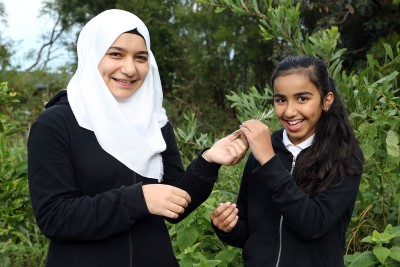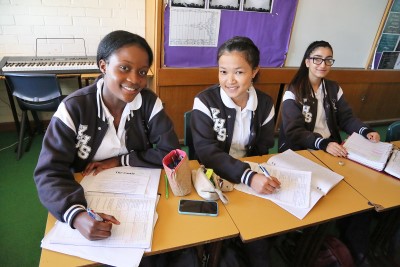Introduction

Developing good study habits and knowing how to best prepare for homework tasks, assessments and exams are essential skills for high school.
By the end of this session you should:
-
learn about good study habits
-
learn about preparing for exams and assessment tasks
-
become familiar with the school library and resources available.
Preparation and resources

To complete this session, you will need access to the following resources:
-
a computer
-
documents (found in the Activities section below)
-
4.1 – Homework and study
-
4.2 – Different ways of learning
-
4.3 – Improve your study skills
-
4.4 – Active study
-
4.5 – Assessment task analysis.
-
Activities

Suggested activities for this session:
As a group, discuss the difference between homework and study, and how you feel about homework and study.
Read through the information in 4.1 – Homework and study and then discuss the difference between homework and study as a class group.
Do you have a quiet place for study at home? As a group, suggest places that you might go to if there are no quiet places to study at home.
Working is pairs or a small group, discuss the various ways of learning outlined in 4.2 – Different ways of learning. Complete the worksheet by listing when and where you might use these different learning activities.
Working with a partner, open a copy of 4.3 – Improve your study skills. Use the word bank and the pictures as clues to help you complete the sentences in the worksheet.
Open a copy of 4.4 – Active study. Working with a partner, read through each of the 5 Study cards and attempt the activities. You will need to use a photocopy from a textbook to complete Study card 3.
When you are finished, return to the group and discuss the different study methods.
Your teacher will supply you with a sample assessment task for this activity. As a group, use 4.5 – Assessment task analysis to work through an assessment task analysis. Your teacher will help you to analyse the assessment task using the worksheet.
Open your Google Drive and make a copy of the worksheet for use with your own assessment tasks.
For this activity you will be visiting the school library. You will meet the school librarian and learn about library staff that can help you, different resources available, how to get a library card, the loans system, internet usage and other services.
Conclusion

Remember to make a note of the different people that you can talk to if you need help developing a study plan or understanding assessment and homework tasks.
If your school has a homework or study program, decide when you will join or visit them for help.
Make a note in your diary about the meeting time for Session 5.
Remember to thank your teachers and other students that you worked with during the session.
Teaching notes
The Welcome Program sessions are designed to be teacher facilitated. Students should not be left to complete the activities without guidance.
This session looks at study habits and how to prepare for homework tasks, assessments and exams.
Aims
-
Students will learn about good study habits.
-
Students will learn about preparing for exams and assessment tasks.
-
Students will become familiar with the school library and resources available.
Before conducting this session, read all of the information in this resource and plan accordingly. You may choose to conduct some activities without using student computers and will therefore need to print out copies of worksheets for the students.
Book the school library for this session and ask the school librarian to give a short talk and tour to students.
Students will need access to the following resources:
-
computers
-
their NSW DoE student account to access Google Drive (test to see if students are able to log on to school computers and access the internet)
-
if students are unable to access Google Drive, you may need to print copies of all the worksheets
-
-
sample assessment tasks (choose samples that are current and appropriate for your students)
-
photocopies of an excerpt from a textbook
-
highlighter pens
-
information about school or local homework programs.
Explain that this session aims to help students with homework, study and assessments.
The following activities should be adapted to meet the needs of your students.
Some students may require additional time for these activities.
Begin by asking the students to define homework and study (possibly as a group discussion). Ask the students to also talk about how homework and study makes them feel.
Have the students open a copy of 4.1 – Homework and study and discuss the difference between homework and study. Suggest places they might go if there are no quiet places at home to study. Explain that this is information they can refer to in the future.
The students should work in pairs or small groups. Have the students open a copy of 4.2 – Different ways of learning. Discuss different ways of learning at school in Australia before completing the worksheet.
You will need to prepare the additional resources that students will need for these activities, for example a photocopied paragraph or excerpt from a relevant textbook that students might be using in class.
Have the students open a copy of 4.3 – Improve your study skills. Ask students to work in pairs and use the picture clues on the worksheet to match words with definitions about ways to study.
Ask students to work through the 4.4 – Active study worksheet in pairs. Each pair will work through the different study cards on the worksheet. Give each pair an excerpt from a textbook for Study card 3. Ask the students for feedback on the different strategies when they have finished.
Issue each student a sample assessment task and use 4.5 – Assessment task analysis to work through an assessment task analysis together. Model to students how to deconstruct an assessment task notification or cover sheet.
Look at the date due and discuss completing the project over time. Help the students to break the task into manageable parts and think about how long will be needed to do each part. Discuss the resources and information that will be needed.
Explain that each assessment task should be accompanied by a formal notification and discuss the importance of completing all assessment tasks on time. Outline any assessment procedures that are particular to your school.
Ask the librarian to introduce themselves and the library to the students. Ask the librarian to help the students to locate the different resources available, explain how to get a library card, use the loans system, and access the internet and any other services that the library has to offer.
Remind students where to go and who to talk to if they need help.
If your school has a homework program, tell the students about this or discuss other programs available in local public libraries.
Tell students if they need further help developing study plans or understanding assessment and homework tasks they can ask their class teacher or EAL/D teacher.
Let students know the time and place of the next session.
For more information, visit the NSW Department of Education’s The Welcome Program website.